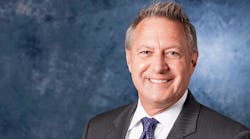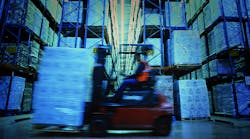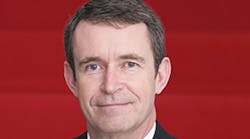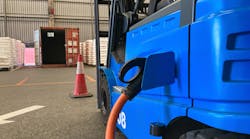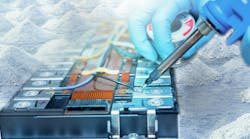Although UniCarriers is the seventh largest forklift manufacturer in the world, the brand itself is pretty new, debuting in 2011. However, the company's lineage actually dates back more than a century to 1914, when one of the companies now included under the UniCarriers name—Barrett, a manufacturer of manual pallet trucks—was founded. Nissan Forklift, whose U.S. headquarters occupied the same Marengo, Ill.-based plant where UniCarriers Americas Corp. (UCA) is now based, was founded 60 years ago in Japan. And TCM, another company that's now part of UniCarriers, began manufacturing forklifts in Japan in 1949. Clearly, a lot of material handling history over the years has been made by UniCarriers under one name or another.
James Radous has been president of UCA, a subsidiary of Japan-based UniCarriers Corp. (which itself is part of the Mitsubishi Heavy Industries conglomerate), since 2016, having previously served in such roles as president of UCA's retail operations and executive vice president of sales.
As a manufacturer with ties to the Japanese automotive industry, UCA is both dedicated to continuous improvement and working very collaboratively with its suppliers, as UCA considers its supply chain partners to be one of its biggest competitive advantages.
At the recent ProMat show in Chicago, MH&L spoke to Radous about UCA's legacy as a U.S. material handling equipment provider, as well as its strong focus on customers, suppliers and especially its workforce.
MH&L: Describe what UniCarrier's continuous improvement culture looks like.
Radous: On Fridays, the executive team does a shop walk around the plant. We'll visit one or two workstations where the supervisor or a member of their team will present an idea or a solution they've come up with. They're all good ideas, and they're all cost savings ideas that the employees themselves have thought about. For instance, one person might say, "I used to have to go get this one piece of equipment here and then walk over there and I'd do this 400 times a day. But I know if I can get this machine redesigned, it'll save me this amount of hours a day and that translates into this amount of dollars." So people themselves are thinking of initiatives and they're justifying their position and how they're showing a return on investment just by thinking outside the box. It's huge.
MH&L: What's your strategy in terms of automation?
Radous: We're using robotic welders as well as human welders at our facility, and we're also using manipulators. And here's the thing: By adding automation we've been able to redeploy our workforce to other areas, so we haven't cut workforce. That's been our commitment to our employees. We have committed to them that they're not going to lose their jobs because of our adoption of automation and robotics. Yes, they might be redeployed or reeducated into other areas, but it's not an employee reduction plan.
So our employees aren't afraid of technology anymore because they know it's not taking their spot; in fact, it's making their jobs easier and safer.
MH&L: Speaking of safety, you've served as the chair of National Forklift Safety Day, so what's your message to the industry on the current state of warehouse safety? What does the industry need to focus on?
Radous: Safety is every day. We highlight it one day of the year, but we need to reinforce safety every day. And the thing about safety is, it's everybody's job—the owners, the managers, the employees, the pedestrians. We can't take these machines for granted. And you're never done with safety. Every time we redesign one of our forklift products we look to add another safety feature. And that isn't dictated through regulations—it's just what we think is the right thing to do.
MH&L: How successful have you been at recruiting young talent?
Radous: We've actually hired a number of interns over the last several years who have turned into full-time employees in our engineering and accounting areas from Northern Illinois University. We've gotten very involved with their engineering department. We went to their recruitment day, and we had 200 resumes that we vetted down to 40 who are now actively working with us.
We brought our youngest and our brightest mechanical and electrical engineers to the recruitment fair, the types of young people who make this industry look great, and they showed the recruits the type of things they're working on. And they would tell the recruits, "These aren't just forklifts—this is the heart of commerce. We're where everything begins." And these students just couldn't wait to see for themselves. We're trying to make this industry fun and exciting again. So that's where it begins.
